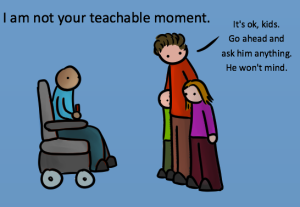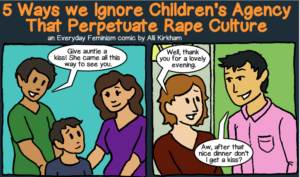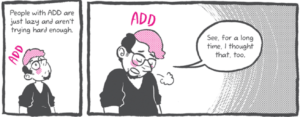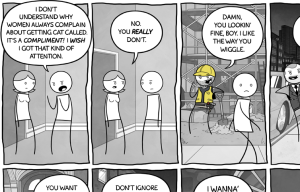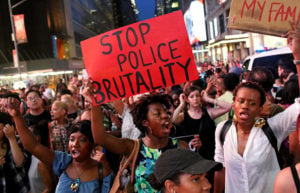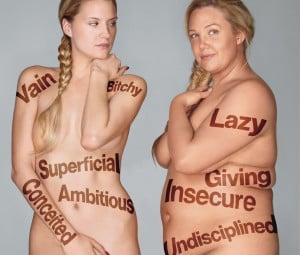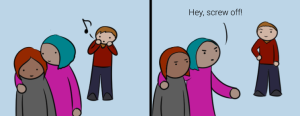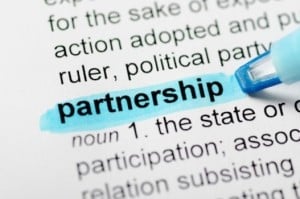
Source: Role/Reboot
Originally published on Role/Reboot and cross-posted here with their permission.
At the spry, still-green age of 32, I’ve recently come around to the realization, be it early or late, that other people now see me as an adult in spite of how juvenile I still sometimes think I am. Cashiers call me “sir.” The price of my car insurance is lower. My knees ache when I climb a flight of stairs.
And yet, in my mind, I still often default to seeing myself as the same young, punk jerkoff I was in my late teens/early 20’s.
It’s not really becoming, I know, so one of the ways in which I try to sever this errant anchor of my post-adolescence has been to become more deliberate in the choices I make, specifically when it comes to how I talk about certain things.
For example, if for some reason things don’t go my way in the pharmacy checkout line, I can’t very well throw a tantrum at that polite cashier. Not that I ever would condone such behavior, but now I realize that while my inner perception would be to write off my would-be disgruntled behavior as youthful agitation, that cashier (and likely everybody within earshot) would probably regard me as that “angry man.”
I can hardly think of a more mortifying epithet for such a public scene, so even if I feel like an outburst is in order, I simply keep quiet and maintain the demeanor of a mild-mannered, near-middle aged man.
However, finding myself in this threshold of adulthood has made me act and think more deliberately about certain aspects of my personal life as I’ve ascended in years, especially when it comes to my relationship with my partner.
Yes, I said “partner.”
She is my partner. She is not my girlfriend. She is not my wife. In the occasionally uber-PC circles, she’s my significant other, but otherwise, she is always my partner.
Choosing to use the word “partner” is somewhat political, but it is also very personal.
Part of this comes from the fact that society insists on a relationship hierarchy wherein people who are legally single aren’t taken as seriously as those who are legally married (ironic, given how casually we treat divorce).
And unfortunately, because my partner and I aren’t legally married, we’re often not taken as seriously as I would like. To some, we haven’t quite finished crossing the threshold into a full-on adult relationship.
It’s as if the absence of a marriage license somehow shallows the quality of our relationship in the eyes of others.
I feel like this diminutive regard is encouraged by the use of terms like “girlfriend” and “boyfriend.”
There’s nothing wrong with having a girlfriend or boyfriend in your 30’s, but there is something reminiscent of adolescence lingering in those terms.
There’s a ring of casualness to them — and that’s perfectly fine if your limit is a casual relationship. For me, though, it’s not a good fit. Not only does “partner” sound more mature, for lack of a better descriptor, but it connotes a deeper level of seriousness.
Beyond personal preference, I also shun terms like “girlfriend” and “boyfriend” for the same reason I dislike “husband” and “wife.” All of these words carry with them embedded gender roles and pre-determinations that I’d rather avoid altogether.
Like it or not, terms like “boyfriend” and “wife” are inseparable from the history of gendered behavior ascribed to these terms.
Just because I would be considered a boyfriend shouldn’t mean I’m automatically knowledgeable about car engines; or that she, as a girlfriend, is inherently fantastic with kids.
Regardless of whether these aspects may or may not be true about us, neither of us wants to give people reason to make assumptions based purely on the fact of being a man or a woman.
Hence, she is my partner, and she is my partner because we believe there should be parity between people in a relationship.
We have an on-going agreement that we do everything equally, and neither of us should be expected to do something simply because I am the man in the relationship, or because she is the woman. Either or both of us can be great mechanics, and either or both of us can be great with kids.
If using the term “partner” robs others of the ability to make such assumptions about us, all the better.
Speaking of assumptions, we also choose to use the word “partner” because we want to force other people to reconsider their assumptions about our sexuality. They may assume I am straight because I am dating a woman, and that would correct. However, they would not be correct in then assuming that my partner is straight simply because she is in a relationship with a man.
This is one of those concepts that causes people’s brains to explode because it defies the preconceived categories they try to force other people into. Listen: Just because I am a man and she is a woman and we happen to be in a romantic relationship does not mean you should automatically assume we’re both hetero.
Sexuality is much more fluid than that, and the sooner we’re all okay with that, the better off we’ll all be. It also should be much easier to simply accept this than to continue on with the unimaginative argument that we must both be straight because we’re in a female-male relationship.
It’s no secret that relationships consisting of any dynamic that is not strictly one male and one female are treated differently in society not just by legal books, but morally so, as well.
In that, I don’t believe that my relationship deserves more legitimacy or respect simply because it happens to resemble what most people have traditionally thought of as a “normal” relationship.
With some small effect, to me the word “partner” effaces the concept of normal, and makes indistinguishable my two-person, male-female relationship from any same-sex or poly relationship.
To borrow a line from Virginia Woolf’s Orlando, the universalness of “partner” helps frame my relationship and any other type of relationship “as like as two peaches on one branch.” It may only be a slight linguistic victory in the effort to subvert heteronormativity, but it would be a victory nonetheless.
In all fairness, some people may use “wife,” “husband,” “fiancé,” or any other traditional term and find that it not only satisfies the meaning in their relationship, but perhaps they’re even trying to take back those terms, maybe de-hetero them a little and make them more elastic so as to include more than just straight, two-person couples.
Maybe people use them just because it’s easier, and everybody gets to pick their battles.
I have no problem with any of that – to each, their own.
And no, choosing to use the word “partner” in place of “girlfriend” or “husband” isn’t going to prompt a cultural tsunami of newfound acceptance and normalcy when it comes to relationships. I wish it were that easy, and I have no such illusions. I simply choose not to passively perpetuate any anachronistic notions of gender in my relationship.
In the end, though, it is much more a personal choice for me than a political choice.
I choose to use “partner” to not only indicate to society that I desire equality in my relationship, but more importantly, to indicate to my partner that, above all else, I unconditionally respect her as a completely autonomous and equal companion.
[do_widget id=”text-101″]
Drew Bowling writes about language, gender, and mental health, although other topics have been known to enter his orbit. When he’s not writing, he spends his time pretending to be a photographer. Follow his messy thought-trail on Twitter.
Search our 3000+ articles!
Read our articles about:
Our online racial justice training
Used by hundreds of universities, non-profits, and businesses.
Click to learn more





